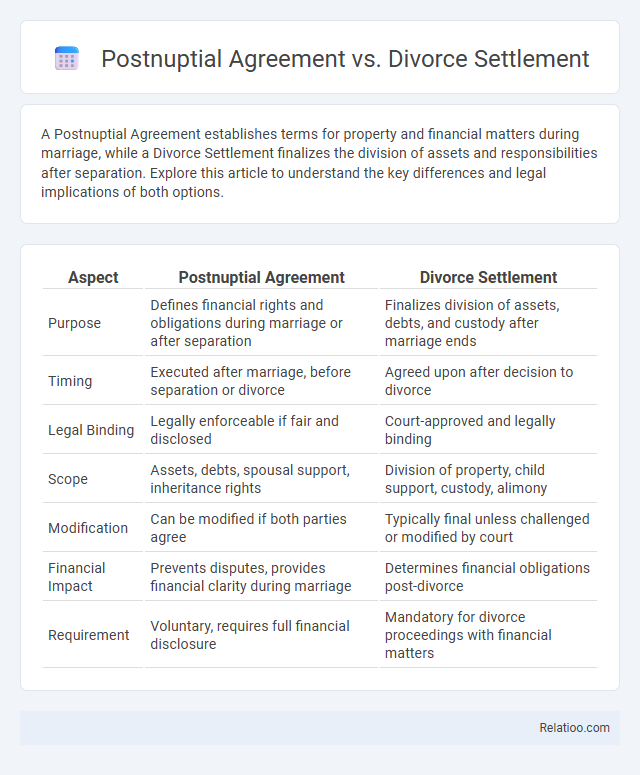A Postnuptial Agreement establishes terms for property and financial matters during marriage, while a Divorce Settlement finalizes the division of assets and responsibilities after separation. Explore this article to understand the key differences and legal implications of both options.
Table of Comparison
| Aspect | Postnuptial Agreement | Divorce Settlement |
|---|---|---|
| Purpose | Defines financial rights and obligations during marriage or after separation | Finalizes division of assets, debts, and custody after marriage ends |
| Timing | Executed after marriage, before separation or divorce | Agreed upon after decision to divorce |
| Legal Binding | Legally enforceable if fair and disclosed | Court-approved and legally binding |
| Scope | Assets, debts, spousal support, inheritance rights | Division of property, child support, custody, alimony |
| Modification | Can be modified if both parties agree | Typically final unless challenged or modified by court |
| Financial Impact | Prevents disputes, provides financial clarity during marriage | Determines financial obligations post-divorce |
| Requirement | Voluntary, requires full financial disclosure | Mandatory for divorce proceedings with financial matters |
Understanding Postnuptial Agreements
A postnuptial agreement is a legal contract created after marriage to outline asset division, financial responsibilities, and spousal support in case of divorce or separation. Unlike divorce settlements that finalize terms during divorce proceedings, postnuptial agreements proactively protect your interests while the marriage continues. Understanding these agreements helps you secure financial clarity and prevent future disputes by clearly defining property rights and obligations.
What Is a Divorce Settlement?
A divorce settlement is a legally binding agreement finalized during divorce proceedings that outlines the division of assets, child custody, support obligations, and other relevant matters between spouses. Unlike postnuptial agreements, which are created voluntarily after marriage to pre-arrange financial or personal terms, divorce settlements result from negotiations or court decisions to resolve disputes during the dissolution of a marriage. This settlement ensures clarity and legal enforcement of rights and responsibilities as couples transition to separate lives.
Key Differences Between Postnuptial Agreements and Divorce Settlements
Postnuptial agreements are legal contracts created by spouses after marriage to outline asset division and financial responsibilities in the event of a separation or divorce, while divorce settlements are negotiated agreements finalized during divorce proceedings to resolve property distribution, child custody, and support issues. Unlike divorce settlements, which occur after spouses have decided to end their marriage, postnuptial agreements serve as proactive planning tools to prevent disputes and clarify terms while the marriage is intact. Understanding the timing, purpose, and enforceability of postnuptial agreements versus divorce settlements is essential for effective marital financial planning and dispute resolution.
Legal Purposes: Postnuptial vs Divorce Settlement
Postnuptial agreements primarily serve to outline the division of assets and financial responsibilities agreed upon by spouses after marriage, providing clarity and protection during the marriage. Divorce settlements focus on legally resolving all marital disputes, including asset division, alimony, child custody, and support, finalized during the divorce process. Both documents are legally binding but differ in timing and scope--the postnuptial agreement is proactive within the marriage, while the divorce settlement is reactive and finalized amid legal separation.
Timing: When Each Agreement Is Used
A Postnuptial Agreement is created after marriage to outline asset division and financial responsibilities, while a Divorce Settlement occurs during or after divorce proceedings to finalize property and custody arrangements. Your choice depends on timing: use a Postnuptial Agreement when planning ahead during marriage, and a Divorce Settlement when legally ending the marriage. Both agreements serve distinct legal purposes, with the Postnuptial Agreement focusing on future marital terms and the Divorce Settlement addressing dissolution details.
Common Provisions in Postnuptial Agreements
Postnuptial agreements commonly include provisions addressing the division of marital assets, spousal support, and debt allocation to provide financial clarity and protection. These agreements often outline the rights and responsibilities of each spouse during the marriage and in the event of separation, differing from divorce settlements which finalize asset division only after separation. Unlike divorce settlements, postnuptial agreements can be modified while the marriage continues, allowing couples to adjust terms as circumstances change.
Typical Terms in Divorce Settlements
Typical terms in divorce settlements often include the division of marital property, spousal support, child custody, and child support arrangements, ensuring a comprehensive resolution of financial and parental responsibilities. Unlike postnuptial agreements, which are created after marriage to outline future asset division under specific circumstances, divorce settlements finalize these decisions as part of ending the marriage. Your understanding of these distinctions helps in navigating the legal landscape to protect your interests effectively.
Enforceability: Validity and Legal Requirements
Postnuptial agreements require voluntary consent, full financial disclosure, and fairness at signing to ensure enforceability in courts, closely paralleling prenuptial agreements. Divorce settlements become legally binding once incorporated into the final divorce decree, but courts may modify terms if circumstances significantly change. Validity hinges on compliance with state-specific legal standards, such as notarization and absence of coercion, distinguishing enforceability between these agreements.
Pros and Cons of Postnuptial Agreements
Postnuptial agreements offer couples the opportunity to outline asset division and financial responsibilities after marriage, providing clarity and preventing future disputes, but they may be perceived as lacking trust or cause emotional strain. Compared to divorce settlements, which finalize asset distribution and custody post-separation, postnuptial agreements serve as preventative measures rather than conclusive resolutions. While similar to prenuptial agreements, postnuptial agreements face stricter scrutiny in court, potentially complicating enforcement if not drafted with comprehensive legal guidance.
Choosing the Right Solution for Your Marriage
Choosing the right solution for your marriage involves understanding the distinct purposes of a postnuptial agreement, divorce settlement, and prenuptial agreement. A postnuptial agreement establishes terms for asset division and responsibilities during marriage or in case of separation, while a divorce settlement finalizes these terms upon legal separation or divorce. Evaluating your unique marital circumstances and goals helps determine whether proactive agreements or a formal divorce settlement best protect your interests.

Infographic: Postnuptial Agreement vs Divorce Settlement
 relatioo.com
relatioo.com